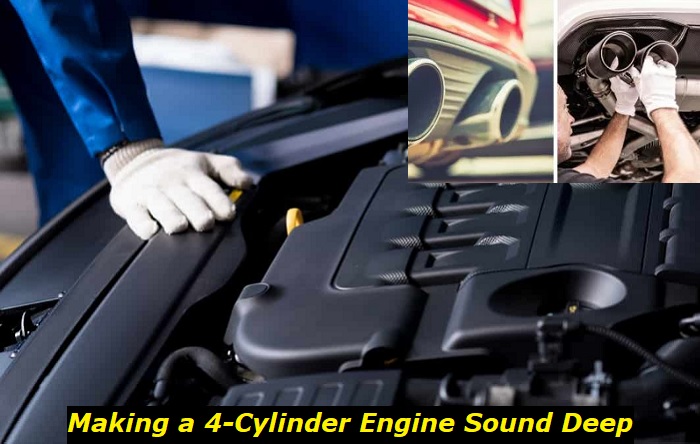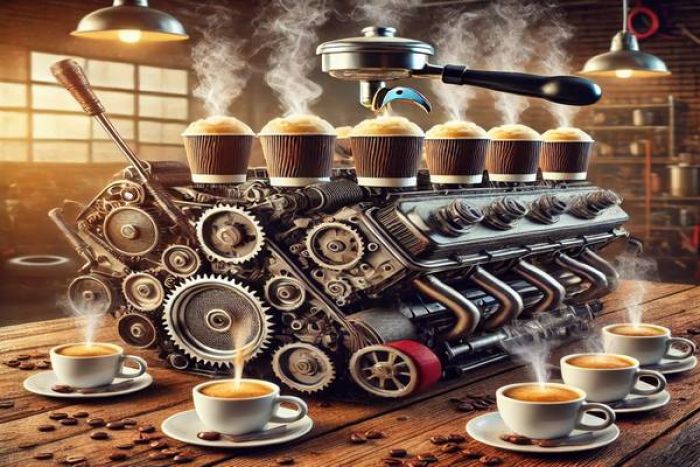A deep-sounding engine can mean a lot of things. First, it indicates that the airflow and mechanical parts of your engine are performing at their best. Second, there's that sweet satisfaction that you can get from enjoying the pure sound coming from your power unit.
Engine sound upgrades highlights
- Commonreasons:pleasure, wish to feel the vibration when driving
- Average prices:$350 - $1,500
- Average waiting time:1 - 3 days
- Common problems:too loud sound, vibrations, no actual gains
- DIY mods:possible
- Level of satisfaction:low

Is It Legal?
Before going through the process, see to it that the upgrade you are planning and the product that you are looking to buy are compliant with the existing laws in your state. The rules vary per state, and the State of California, through the California Air Resources Board (CARB), is particularly known for its stringent requirements when it comes to this matter.
Specifically, check for legal regulations pertaining to vehicle modifications in your location. Some have very strict provisions that prescribe limitations regarding the parts in your auto that can be altered. They may also contain a certain set of procedures to be followed when it comes to this subject, including but not limited to official paperworks and inspections.
Next, review the air and noise pollution restrictions enforced in the place where you will be driving your vehicle. With that, the resulting noise of your auto after the enhancements should not exceed the maximum decibels allowed by law. Likewise, the subsequent emissions, if there are any changes, should be within permissible levels, too. Do include in your research the general standards mandated by regulating bodies like the Environmental Protection Agency (EPA) and its cooperating agencies like the Department of Motor Vehicles (DMV).
Lastly, the improvements should be within the ambit of the safety protocols imposed by the National Highway Traffic Safety Administration (NHTSA) and other state-sanctioned regulatory entities.
The additional research may take you some extra time and effort, but it's definitely worth it if you want to squeeze out the best performance from your engine while dodging any potential problems along the way.
Best Ways to Make Your 4-Cylinder Sound Deep
With those things out of the way, here are the best ways to make your four-cylinder engine stand out with its deeper sound:
1. Cold Intake Upgrade
When it comes to engine noise, a cold intake upgrade can certainly make a difference. By colder, we mean denser air. And by denser, we mean more oxygen molecules per unit of volume. More oxygen molecules mean more potential for combustion, and that extra combustion can make the engine sound deeper.
Now, whether or not a cold intake will actually affect the exhaust quality of your vehicle depends on a few factors. One is the composition of your exhaust system. If you have a well-designed system with good flow characteristics, then the additional combustion from the cold intake is likely to result in a cleaner, more efficient burning overall. But if your exhaust system is restricted or otherwise not up to snuff, then those extra oxygen molecules might just make things worse.
Another factor to consider is the tune of your engine. If it's already running close to its optimal air/fuel ratio, then adding more oxygen isn't going to do much good. In fact, it could potentially throw things off and make the engine run leaner than ideal, which could lead to all sorts of problems. So, if you're thinking about a cold intake upgrade, be sure to get your engine tuned properly first.
In the end, whether or not a cold intake will make your engine sound deeper is largely dependent on the individual car and setup. But if everything is set up properly, it's certainly possible that you'll notice a difference in both the tone and quality of your engine noise.
Depending on the make, model, quality, and place where you will be buying the upgrade plus the prevailing rates for labor in your area, a cold air intake enhancement will typically cost you around $200 for those sold at surplus aftermarket shops or on an average of between $300 to $500 for the better-quality replacements. Exotic products, on the other hand, will probably take you a whopping $700 to $900.
A pure cold intake upgrade alone will not make your engine louder. However, do note that there are certain products packaged with features that may dramatically alter the noise of your engine, and it may make it louder as a result. Likewise, there are others that might affect the quality of your emissions. So, see to it that it is within regulations and make sure that the installation will not pose any problem with your engine or any safety hazard in your vehicle.
2. Custom Muffler
A custom muffler can make an engine sound deeper for a number of reasons. First, the shape of an aftermarket muffler can cause the exhaust gases to travel through it more slowly, which gives the gases more time to interact with the walls of the muffler. This interaction amplifies low frequencies, giving the engine noise a deeper tone.
Additionally, custom mufflers often have less restrictive internal designs than stock mufflers, which allows exhaust gases to flow more freely and further contributes to a deeper sound. Finally, custom mufflers are often made from materials that absorb sound better than the materials used in stock mufflers, which also helps to give the engine noise a deeper tone.
In most cases, using a custom muffler will not affect the emission quality of the vehicle. This is because the muffler is not located in the path of the exhaust gases until after they have passed through the catalytic converter, which is responsible for reducing harmful emissions.
The cost of a new muffler can range between $100 and $500. It may go north from there if you are looking for premium or high-performance products as well as whether or not you have also introduced several upgrades in your exhaust system.
3. Modified Exhaust System
A deeper-sounding engine can be achieved by making a few modifications to the exhaust system. Depending on the vehicle, this may involve changes to the muffler, exhaust pipes, and catalytic converter.
One way to change the sound of the engine is by altering the size or shape of the exhaust pipes. This can be done by installing pipes that are larger in diameter, or by installing pipes with a different shape. Another way to change the sound of the engine is by changing the muffler. This can be done by installing a muffler that is designed to produce a deeper sound.
Changing the exhaust system may affect the emission quality of the vehicle. In some cases, it may cause the vehicle to emit more pollutants. Therefore, it is important to check with local emission regulations before making any modifications.
Overall, this can cost you between $100 to $,2000 or even more depending on the components that you are adding to your vehicle.
4. ECU Tune
An ECU tune can recalibrate the ignition timing, which can affect the engine's firing order and create a deeper sound. Additionally, an ECU reconfiguration can also adjust the fuel map, which can enrich the air/fuel mixture and create a deeper exhaust note. While you're at it, this is also a great way to add a little boost to the output of your engine.
In terms of emissions, an ECU reconfiguration will usually not have a significant impact. However, if the ignition timing is significantly altered or the fuel map is too rich, then there could be a negative impact on emission quality. Therefore, it is important to consult with a professional tuner before making any major changes to the ECU.
The price of ECU tuning varies depending on the specialist doing it, the make and model of your car, and other factors. These could drive you between $400 to $2,000 or even more if you are integrating other performance-oriented upgrades or you are opting for premium services.
Other Repercussions
There are other things that you may also sacrifice depending on the level of upgrade that you are looking to apply to your vehicle, and these are:
1. Voided Warranty
Invasive procedures for upgrades, especially those that deal with the original design or operation of your engine, are certain to void your vehicle's warranty or insurance. Therefore, if you are still paying for any of them, give this upgrade a lot of thought and weigh down its benefits before proceeding.
2. Complaints from Neighbors
If the upgrade also adjusts the level of noise produced by your engine, the louder sound may result in some complaints from your neighbors. This could potentially lead to an encounter with the authorities.
3. Extra Maintenance
Modifications can sometimes cause unexpected issues or problems that may not have been present in the original engine design. This can mean that more frequent maintenance or repairs may be needed to keep the engine running properly. Additionally, modified engines often require specialized parts that can be difficult or expensive to source. Finally, since modified engines may not be covered by standard warranties, any repairs or maintenance will need to be paid straight from your pocket.
4. Poor Fuel Economy
A modified engine may lead to poor fuel economy for plenty of reasons. The most common is that the modifications have recalibrated the engine's timing or have made changes to the way that the air intake or exhaust system operates.
5. Not Compatible with Every Engine Specs
Many upgrades only work for specific types of engines. Assess first if the modification you are planning is compatible with the make and model of your power unit before going further. Likewise, mods may not work well with engines or exhaust systems that are already operating at near their peak performance.
Conclusion
For hardcore car lovers, there's no substitute for that pure sound that your engine brings. Most four-cylinder engines can be very generic when it comes to the note they emit, but considering the methods shown here can significantly alter them to make them produce a deeper sound that you can truly appreciate.
Do remember to review the mods that you are looking to integrate before proceeding though, and make sure that the resulting upgrade is always within the regulations present in the area where you will be frequently driving your car to truly enjoy your on-road experience.
About the authors
The CarAraC research team is composed of seasoned auto mechanics and automotive industry professionals, including individuals with advanced degrees and certifications in their field. Our team members boast prestigious credentials, reflecting their extensive knowledge and skills. These qualifications include: IMI: Institute of the Motor Industry, ASE-Certified Master Automobile Technicians; Coventry University, Graduate of MA in Automotive Journalism; Politecnico di Torino, Italy, MS Automotive Engineering; Ss. Cyril and Methodius University in Skopje, Mechanical University in Skopje; TOC Automotive College; DHA Suffa University, Department of Mechanical Engineering






Add comment